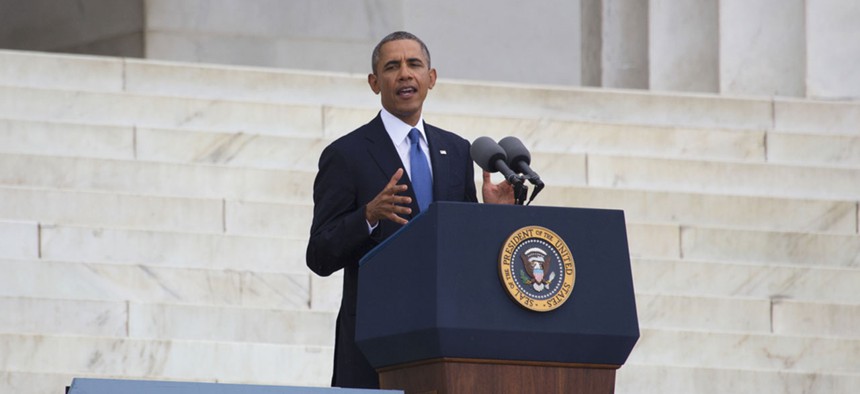
Joseph Sohm / Shutterstock.com
The Gun-Control Rift Exposed by Obama
Voter bases at odds on guns are likely to see their parties ramp up rhetoric on the issue in 2016.
By renewing his push to expand background checks on gun sales, President Obama on Tuesday vastly increased the odds that gun control will play a larger role in the 2016 election than in any presidential contest since 2000.
With Hillary Clinton immediately embracing it, and the leading Republican presidential contenders all quickly condemning it, Obama’s proposed executive action to expand background checks for gun sales is likely to widen the cultural chasm between the parties that defines the 2016 race.
As the chart below underscores, gun control now generates sharply contrasting reactions from the groups central to each party’s electoral coalition.
How Key Voting Blocs View Guns

The survey interviewed 2,002 adults by landline and cell phone. It has a margin of error of ±2.5 percentage points for the entire sample. (Pew Research Center)
The split is most apparent when looking at the philosophic question at the core of the gun-control debate: whether it is “more important to protect the right of Americans to own guns or to control gun ownership.” When the independent Pew Research Center last asked that question in July 2015, it found that slightly more adults prioritized controlling gun ownership (50 percent) than emphasized protecting gun rights (47 percent). During the 1990s, a solid majority of Americans leaned toward controlling gun ownership on that question; since Obama took office, the results have oscillated, but always remained close to a 50-50 split.
More striking than the slight tilt toward gun control in the latest poll was the sharp divergence between the groups that each party now relies upon most.
Like gay marriage, access to free contraception under the Affordable Care Act, legal status for undocumented immigrants, legalized abortion, and action against climate change, gun control now helps knit together a Democratic coalition bound largely by shared cultural values—while further alienating the culturally conservative groups of older, blue-collar, and non-urban whites increasingly pivotal to Republican electoral fortunes.
Gun control thus joins that lengthy list of cultural divides that is largely helping Democrats among white-collar urbanized voters (especially women) like those in Northern Virginia or the suburbs of Philadelphia and Denver, but further weakening them among blue-collar and exurban and rural voters (especially men) in the same states and beyond. In many key swing states, the rising visibility of gun issues in 2016 could exacerbate the sharp urban/rural divide that defined such closely decided contests as the narrow Democratic victories in the 2014 Colorado governor’s race and Virginia Senate race.
Democrats largely muted their advocacy of gun control after the 2000 presidential election, when many in the party concluded that it drove away blue-collar whites and contributed to Al Gore’s photo-finish defeat by George W. Bush. But Obama’s proposal—and the comparably ambitious plans that Hillary Clinton has advanced—shows how much changes in the party’s coalition have changed its calculation on the issue.
Since 2000, Democrats have grown far less dependent on the blue-collar whites who are the most resistant to gun-control measures, and have replaced them with growing groups like people of color and college-educated white women more open to the idea. In one telling measure, whites without a college education provided about half of Bill Clinton’s votes in the 1992 presidential election—but only one fourth of Obama’s in 2012. That shift has encouraged Democrats to press the issue more forcefully. Hillary Clinton is now even running ads in New Hampshire touting her support for “universal background checks” for gun purchases and insisting, “How many people have to die before we actually act, before we come together as a nation?”
The result is that after years in which Republicans were more confident than Democrats in debating gun-control questions, the issue now energizes each side’s coalition. Gun control is still a difficult issue for Democrats in the struggle for control of Congress, largely because the Senate’s small-state bias provides disproportionate leverage to the rural states where it is most unpopular.
But at the presidential level, Democrats appear certain to wage the issue more aggressively than in any campaign since 2000; they have regained confidence that it is a winning argument with the groups, and in the states, that they can actually win. The price, as the chart above shows, is that it further alienates the culturally conservative whites already moving away from Democrats around other issues—a trend that could prove most challenging for the party’s presidential nominee in aging, heavily blue-collar Rust Belt battlegrounds like Ohio, Michigan, and Wisconsin.
(Image via Joseph Sohm / Shutterstock.com)







